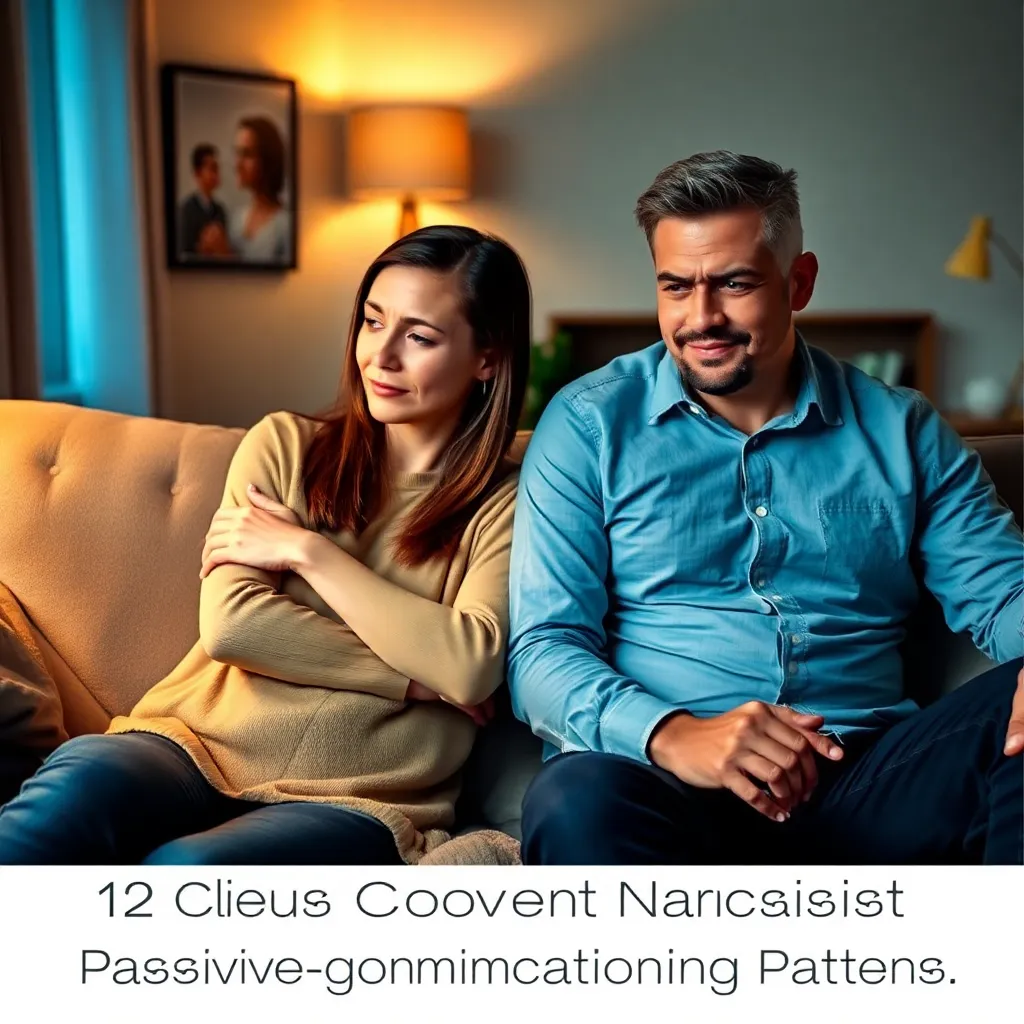Navigating relationships with individuals who exhibit narcissistic traits can be challenging, especially when those traits aren’t immediately obvious. If you’ve ever felt confused or drained by someone’s behavior, yet couldn’t quite pinpoint why, you might be dealing with a covert narcissist. Unlike their overt counterparts, covert narcissists operate quietly, often leaving you questioning your own perceptions and feelings. Understanding these subtle manipulations is crucial for maintaining your emotional well-being and sanity.
Recognizing the signs of a covert narcissist is the first step towards reclaiming your emotional space and setting healthy boundaries. In this article, we’ll delve into 12 key clues that can help you identify the presence of covert narcissism in your life. By learning to spot these signs, you can better protect yourself and make informed decisions about the relationships you choose to nurture. We’ll guide you through this process with compassion and clarity, ensuring you feel supported every step of the way.
Equipped with this knowledge, you’ll be empowered to address the challenges posed by covert narcissists, fostering healthier interactions and a more balanced personal life. You’ll discover practical strategies to manage these relationships, ensuring your emotional needs aren’t overshadowed by the subtle tactics of manipulation. Our goal is to provide you with the tools and insights necessary to navigate these complex dynamics with confidence and grace. As you read on, know that you are not alone, and understanding is the first step towards empowerment.
1. Identifying Covert Narcissism Traits

Recognizing the subtle signs of a covert narcissist can be challenging, as they often display behaviors that are less obvious but equally damaging. Unlike their more overt counterparts, covert narcissists may seem humble or even shy, masking their narcissistic tendencies under a guise of quiet introspection.
In many relationships, a covert narcissist might exhibit an uncanny ability to make you feel guilty or question your own worth. For instance, they might subtly undermine your achievements with backhanded compliments or dismissive remarks, leaving you feeling unappreciated.
Experts suggest that one key trait of a covert narcissist is their tendency to play the victim while avoiding responsibility for their actions. This behavior can manifest in everyday scenarios, such as them exaggerating their hardships to garner sympathy, without acknowledging how their actions affect others.
Another telltale sign is an extreme sensitivity to criticism, often leading to passive-aggressive responses when confronted. If you notice a pattern of defensiveness or avoidance in discussions about their behavior, it may be indicative of this hidden narcissistic trait.
Understanding these nuances can empower you to protect your emotional well-being and set healthier boundaries. As you learn to identify these traits, you gain the insight needed to navigate relationships with a greater sense of clarity and confidence.
2. Subtle Signs of Manipulation

Recognizing the subtle signs of manipulation by a covert narcissist can feel like unraveling a complex puzzle. Often, their manipulative tactics are so well-disguised that they appear as mere coincidences or misunderstandings. Imagine a partner who consistently dismisses your feelings by suggesting you’re overreacting—this is a classic tactic of emotional invalidation. Over time, this can erode your confidence, making you question your own perceptions and feelings.
Another way covert narcissists manipulate is through conditional affection. They might shower you with warmth and care only when you behave in ways that align with their desires. Picture a scenario where compliments flow only when you’ve accomplished something that benefits them, subtly training you to seek their approval. This conditional love can lead to an exhausting cycle of trying to please them at the expense of your own needs.
Covert narcissists may also engage in gaslighting, a technique that involves making you doubt your reality. For instance, they might insist you never told them something you clearly remember discussing, leaving you feeling confused and unsure. Over time, these small manipulations accumulate, leading you to rely on their version of events rather than your own memory or judgment.
While these tactics can be subtle, their impact is profound and far-reaching. By paying attention to these behaviors and trusting your instincts, you can begin to reclaim your sense of self and establish healthier boundaries. The key takeaway here is to remain vigilant and prioritize your emotional well-being above all else.
3. Emotional Invalidation Tactics

Covert narcissists often engage in emotional invalidation tactics that can leave their partners feeling confused and unsupported. These tactics might not be immediately obvious, as they often disguise their dismissive behavior under the guise of being pragmatic or realistic.
Imagine a situation where you express excitement about a new job opportunity, only to have your partner respond with a dismissive comment about potential pitfalls. Instead of offering support, the covert narcissist may subtly undermine your confidence by focusing solely on the negatives, leaving you to question your own feelings.
In relationships, this behavior can manifest as a partner frequently downplaying your emotions or concerns. When you express that something has upset you, they might respond with phrases like, “You’re overreacting,” or “It’s not a big deal,” effectively invalidating your experience and feelings.
Experts suggest that recognizing these patterns early can be crucial for maintaining your emotional well-being. Seeking professional guidance, such as therapy, can provide you with strategies to address and navigate these situations effectively.
By understanding the subtle ways in which emotional invalidation occurs, you can take steps to protect your emotional health. Remember, a healthy relationship is built on mutual respect and understanding, where both partners’ feelings are valued and acknowledged.
4. Expertly Hidden Self-Absorption

In the realm of relationships, it’s often challenging to notice when someone is subtly self-absorbed. Covert narcissists have mastered the art of hiding their self-centeredness behind a facade of humility and concern. Imagine a partner who always manages to redirect discussions back to themselves, even subtly. They might disguise this behavior with a well-placed compliment or by pretending to be interested in your life.
For instance, during a conversation about your achievements, a covert narcissist might commend your success but quickly segue into a similar story about their own. This shift in focus is often so seamless that it feels natural. In these interactions, it’s crucial to recognize the pattern and gently steer the conversation back to a balanced exchange.
Experts suggest that the key to dealing with this behavior lies in setting firm boundaries. By calmly asserting your need for a reciprocal conversation, you can encourage healthier communication. It’s also important to acknowledge these behaviors for what they are—unhealthy relationship dynamics that need addressing.
Ultimately, recognizing and addressing expertly hidden self-absorption can lead to more meaningful interactions. By maintaining awareness and open communication, you can foster a relationship where both partners feel valued and heard. Building this awareness empowers you to navigate these dynamics with empathy and understanding, promoting a healthier relationship atmosphere.
5. Playing the Victim Card

In many relationships, covert narcissists often excel at playing the victim card, subtly shifting the focus away from their own actions. This tactic involves cleverly transforming any outcome into one where they appear to be the one wronged or misunderstood. For instance, in a disagreement about household responsibilities, a covert narcissist might lament how overwhelmed they are with work, hence why they couldn’t help out, painting themselves as the one to be pitied.
This tactic can make it challenging to hold them accountable, as any attempt to address their behavior is met with a defensive posture. By painting themselves as a perpetual victim, they can deflect criticism and garner sympathy from others. In such scenarios, an empathetic partner might feel inclined to comfort them rather than pursue the original concern. This cycle can leave the partner feeling unheard and frustrated over time.
Understanding this dynamic is crucial for maintaining a healthy relationship. It’s important to recognize when genuine distress is being expressed and when it’s a strategic move to avoid responsibility. In situations where you suspect manipulation, it helps to gently steer the conversation back to the issue at hand, while acknowledging their feelings.
Ultimately, recognizing these patterns can empower you to set healthier boundaries and advocate for a more balanced relationship. By staying attuned to these behaviors, you can navigate the complexities of relationships with covert narcissists more effectively. Remember, a balanced approach that combines empathy with assertiveness can lead to more harmonious interactions.
6. The Art of Silent Treatment

In the realm of covert narcissism, the silent treatment is wielded as a subtle yet powerful weapon. This tactic involves withdrawing communication to create feelings of anxiety and self-doubt in the other person. Imagine being in a relationship where suddenly, without apparent reason, your partner stops responding to your texts or ignores you in social settings. This behavior can leave you questioning your own actions, wondering if you’ve done something wrong.
Experts suggest that the silent treatment is often used to maintain control without overt confrontation. It allows the covert narcissist to manipulate the emotional landscape, leaving their partner feeling isolated and insecure. In a real-world scenario, you might find yourself repeatedly apologizing for an issue you don’t fully understand, just to restore peace. This can lead to a cycle where you feel increasingly dependent on their approval to feel emotionally secure.
To effectively manage this situation, it’s crucial to recognize the pattern and set boundaries. Open communication is essential; however, if your partner continues to withhold communication as a form of punishment, consider seeking external support. Consulting with a relationship coach or therapist can provide strategies to navigate this dynamic. Such support can help you build resilience against emotional manipulation and regain your emotional independence.
Ultimately, understanding the silent treatment as a manipulative tactic can empower you to make informed decisions about your relationship. By fostering open communication and maintaining your own emotional health, you can create a healthier dynamic. Remember, your emotional well-being is just as important as the relationship itself, and taking proactive steps can lead to more fulfilling interactions. This insight can be a stepping stone towards a more balanced and respectful partnership.
7. Feigning Empathy and Concern

Covert narcissists often excel at **feigning empathy and concern**, skillfully masking their true intentions. They may offer comfort and listen intently when you’re sharing your struggles, but their primary goal is often to **gain your trust** and manipulate your emotions.
In relationships, this can manifest as them being the first to offer a shoulder to cry on, only to later use your vulnerabilities against you. Imagine a partner who listens to your work stress, only to later suggest your inability to handle pressure as a reason you shouldn’t pursue a promotion.
Experts note that a covert narcissist’s empathy often lacks genuine emotional depth, characterized by **a performance rather than a true connection**. Their empathy may seem scripted, often failing to provide the emotional support one might expect from a genuinely empathetic partner.
To protect yourself, observe whether their empathy feels authentic or rehearsed.
By recognizing these patterns, you can maintain healthier boundaries and safeguard your emotional well-being.
8. Passive-Aggressive Communication Patterns

In the realm of covert narcissism, passive-aggressive communication patterns are often a subtle yet powerful tool. These individuals might use backhanded compliments or veiled criticisms that leave their partners feeling confused and hurt. For instance, a partner might say, “It’s great that you finally managed to make a decision on your own,” which seems supportive but carries an underlying jab at one’s decision-making abilities.
Another hallmark of this behavior is their tendency to avoid direct confrontation. Instead of openly expressing dissatisfaction, they may resort to sulking or giving the silent treatment. This indirect approach can create an unhealthy atmosphere where issues linger unresolved, frustrating those who prefer clearer communication.
Real-world examples often include situations where a partner subtly sabotages plans by continuously showing up late or conveniently forgetting important dates. This behavior can leave the other partner feeling insignificant and undervalued, eroding trust over time. To address this, it’s crucial to establish clear communication boundaries and express how these actions affect the relationship.
Experts suggest that addressing passive-aggressiveness involves recognizing and naming the behavior as it occurs. Openly discussing its impact can help demystify the manipulative undertones and foster a healthier dialogue. Ultimately, the key takeaway is to remain vigilant about these communication patterns and strive for transparency in all interactions.
9. Gaslighting and Reality Distortion

In the subtle world of covert narcissism, gaslighting and reality distortion are insidious tools used to manipulate and control. You might find yourself constantly questioning your own experiences and emotions, wondering if you’re the one who’s misinterpreting events.
Imagine a scenario where your partner insists a conversation never happened or twists the details to make you doubt yourself. This behavior slowly erodes your confidence and self-trust, making you reliant on their version of reality.
Experts suggest that recognizing gaslighting begins with trusting your instincts and validating your own perceptions. When you feel something is off, it’s crucial to document conversations or events as they occur, creating a reference point to ground your reality.
To counteract reality distortion, seek external perspectives from friends or a therapist who can provide an objective viewpoint. This external validation can help you rebuild your confidence and reaffirm what you know to be true.
Ultimately, the key to breaking free from this cycle is to strengthen your sense of self and seek supportive relationships that honor your truth. By taking these steps, you can safeguard your emotional well-being and navigate relationships with resilience.
10. Exploiting Vulnerabilities Quietly

In the quiet corners of a relationship, a covert narcissist may subtly exploit a partner’s vulnerabilities. They often use intimate knowledge to manipulate emotions, leaving the partner feeling exposed and unsupported.
For instance, they might bring up a partner’s past insecurities during moments of weakness to gain the upper hand. By doing so, they create a dynamic where their partner feels constantly on edge, doubting their own worth and stability.
Over time, this behavior can lead to a partner feeling increasingly isolated and unsure of their own perceptions. It’s a tactic that allows the narcissist to retain control while feigning empathy and understanding.
To counteract this, it’s crucial to establish and maintain clear boundaries in the relationship. Acknowledging these tactics and seeking external support from friends, family, or a therapist can help reinforce your emotional armor.
Understanding these subtle manipulations can empower you to safeguard your emotional well-being. Remember, a healthy relationship should feel like a partnership, not a battleground.
11. Appearing Humble Yet Superior

When dealing with a covert narcissist, one often encounters individuals who project an aura of being genuinely **humble**, yet they subtly express a sense of **superiority**. They might downplay their achievements in a way that invites others to praise them, creating a dynamic where their **superiority** is still recognized but not overtly stated.
Imagine a partner who constantly **compliments** others while hinting at their own minor **accomplishments**. This approach allows them to come across as **humble** and grounded, but beneath the surface, they are seeking validation to reinforce their **superiority**.
Experts suggest that this behavior often stems from a need to maintain a **positive self-image** without appearing overtly arrogant. By **acting humble**, they subtly manipulate the perception of others, ensuring that they remain in a position of **admiration** and **respect**.
To navigate this dynamic, it’s crucial to recognize when someone’s **humility** is genuine versus when it’s a facade for **superiority**. **Open dialogue** and setting clear boundaries can help in addressing these behaviors, ensuring that relationships are based on authenticity rather than manipulation.
Ultimately, it’s about creating space for each person’s **true self** to be valued without the need for hidden agendas. By doing so, you lay the groundwork for more **honest** and fulfilling connections.
12. Recognizing Red Flags Early

Recognizing red flags early can save you from emotional turmoil and heartache. In a relationship, it’s crucial to be aware of subtle behaviors that might indicate a partner’s covert narcissism.
Perhaps you’ve noticed your partner’s consistent need for validation, yet they dismiss your achievements. This subtle competition can erode your self-esteem over time, leaving you questioning your worth.
Imagine thinking you’re in a supportive relationship, only to realize you’re always the one apologizing. This imbalance often stems from a manipulative partner who skillfully twists situations to maintain their image.
A trusted therapist might advise you to trust your gut when something feels off. Early intervention and communication can prevent a potentially toxic dynamic from taking root.
In the long run, confronting these red flags early can lead to healthier relationships. By prioritizing your emotional wellbeing, you set the foundation for a partnership built on genuine respect and understanding.
Conclusion: Creating Beautiful Outdoor Spaces
In navigating the complexities of relationships, recognizing the subtle signs of a covert narcissist can be transformative. This article has unveiled 12 key concepts: the quiet arrogance masked by modesty, the chronic victimhood, covert manipulation, hidden competitiveness, passive aggression, a facade of humility, gaslighting tendencies, emotional neglect, a fragile sense of self cloaked in criticism, backhanded compliments, an avoidance of responsibility, and their strategic alliances for self-gain.
Understanding these traits is a powerful step toward nurturing healthier relationships. As you digest these insights, your immediate action could be to reflect on your interactions and identify any patterns that resonate with these clues. This awareness will empower you to set clearer boundaries and engage more authentically with those around you.
We encourage you to save or bookmark this article as a valuable resource. By revisiting these insights, you can strengthen your ability to recognize and address covert narcissistic behaviors.
Looking forward, remember that relationship success is built on awareness, communication, and mutual respect. Your journey toward healthier, more fulfilling relationships begins with these first steps—and the knowledge you’ve gained today is your guide.
